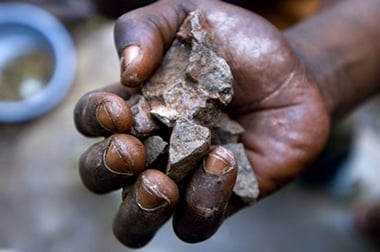Conflict minerals
Alfa Laval and conflict minerals: Most of Alfa Laval’s products contain various metals which originate in mines around the world. Some of our products may contain tantalum, tin, tungsten and gold (3TG minerals), which are often essential for the performance of the product, providing for example corrosion resistance, wear resistance or electrical conductivity.

Alfa Laval Conflict Minerals Policy Statement
The 3TG minerals, along with the ores from which they originate, are known as conflict minerals* because it is believed that armed conflict, and related human rights abuses, in the Democratic Republic of the Congo (DRC) and adjoining countries (the DRC region) may be directly or indirectly financed by the trade in the 3TG minerals, which are mined in the DRC region. Alfa Laval deplores this violence and abuse and is committed to responsible sourcing of conflict minerals from the DRC region.
In July 2010, the U.S. Congress applied commercial pressure to help stop the terrible human rights abuses in the DRC region by including a requirement in the Dodd-Frank Wall Street Reform and Consumer Protection Act directing the U.S. Securities and Exchange Commission (SEC) to promulgate rules requiring certain reporting companies to disclose whether the sources of conflict minerals in their product offerings are conflict free.
Alfa Laval supports the SEC’s rules and other conflict-free initiatives. Alfa Laval’s ambition is having a conflict-free supply chain. We will conduct due diligence on our supply chain to reasonably ensure that minerals originating from the DRC region are from conflict free sources. Alfa Laval has the ambition to follow the Organisation for Economic Co-operation and Development (OECD) Due Diligence Guidance for Responsible Supply Chains of Minerals from Conflict-Affected and High-Risk Areas, and we encourage our suppliers to have in place policies and due diligence measures that will enable us to reasonably assure that the materials that they supply to us are conflict free. Alfa Laval will collaborate with and disclose this information to our customers who are required (or whose end-customers may be required), or who have voluntarily decided, to comply with the SEC’s rules, as well as other similar regulations and initiatives that may be adopted by other nations and international communities, such as the European Union.
To mitigate the unintended consequence that this regulation causes a widespread withdrawal from trade with the DRC region, Alfa Laval believes it is essential to establish validated, conflict free sources of 3TG minerals within the DRC and adjoining countries so that these metals and minerals can be procured in a way that contributes to economic growth and development and stability in the region, rather than to violence and human rights abuses. (December 2013)
Our progress
Since 2013, we have worked systematically with the ambition to achieve conflict free deliveries to our customers.
We started our "journey" by gathering information using available sources of information including:
- Dodd-Frank Wall Street Reform and Consumer Protection Act
- SEC Rules and Guidance
- OECD Guidelines
- Other international initiatives and regulatory regimes (such as the EU)
We continued by determining the applicability of conflict minerals to our products and conducting risk assessments. We started a pilot with one of our products (Brazed Heat Exchangers) in order to learn how to work with this issue within our company and with our products.
We work according to the following process to reduce the risk of exposure to conflict minerals. Progress is reported in the Alfa Laval Sustainability Report:

- The customer request process includes logging of requests and internal process to answer these requests.
- Our product process encompasses risk assessment (which current or coming products use 3TG and thus run the risk of using conflict minerals), education and training for relevant employees and identification of suppliers of 3TG.
- The supplier process includes identification of relevant suppliers, contact with suppliers, collection of relevant information and follow-up procedures.
Due diligence is an important part of working towards our ambition to reach conflict free deliveries to our customers .We intend to implement due diligence processes that are sustainable, so that our information may be updated as circumstances dictate, such as changes in product categories, extensions of existing product lines, acquisitions, additions of new brands, changes in our selected suppliers and in our suppliers' supply chains, alterations to material composition, and changes in product design.
